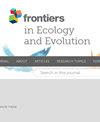Variations in gut microbiota associated with changes in life-history traits of Daphnia galeata induced by fish kairomones
IF 2.4
3区 环境科学与生态学
Q2 ECOLOGY
引用次数: 0
Abstract
The gut microbiota plays a crucial role in host physiology and the disruption of host–microbiota relationships caused by environmental stressors can impact host growth and survival. In this study, we used Daphnia galeata as a model organism to investigate the interactive effects of fish kairomones on the life-history traits and gut microbiota alterations of D. galeata, as well as the relationship between life-history traits and gut microbiota composition. The presence of fish kairomones enhanced fecundity, decreased growth, and altered gut microbiota, with significant changes in alpha diversity but not in beta diversity in the genotype KB5 of D. galeata. Statistical analysis revealed that the relative abundance of the Pseudomonadaceae family significantly increased upon exposure to fish kairomone, while the relative abundance of the Comamonadaceae family significantly decreased. The decreased growth in genotype KB5 may be associated with a significant increase in Pseudomonas, a member of the family Pseudomonadaceae, which is generally deficient in essential fatty acids, potentially negatively impacting growth. Meanwhile, it is speculated that the significant decrease in Limnohabitans belonging to the Comamonadaceae family is associated with the reduction of body size and increased fecundity of KB5 when exposed to fish kairomones. Furthermore, the genus Candidatus Protochlamydia was observed only under the fish kairomones-treated condition. These data suggest that variations in host life-history traits related to reproduction and growth are potentially associated with the relative abundance or presence of these microbial genera. Our research findings provide valuable insights into understanding the impact of biotic stress on the interaction between hosts and microbiota.与鱼类凯洛蒙诱导的水蚤生活史特征变化相关的肠道微生物群变异
肠道微生物群在宿主生理过程中起着至关重要的作用,环境胁迫因素对宿主与微生物群关系的破坏会影响宿主的生长和存活。本研究以水蚤(Daphnia galeata)为模式生物,探讨了鱼类凯氏酮对水蚤生命史性状和肠道微生物区系改变的交互作用,以及生命史性状与肠道微生物区系组成之间的关系。鱼腥草酮的存在提高了杜父鱼的繁殖力,降低了杜父鱼的生长速度,并改变了杜父鱼的肠道微生物群,杜父鱼基因型KB5的α多样性发生了显著变化,但β多样性没有发生显著变化。统计分析显示,暴露于鱼腥草酮后,假单胞菌科的相对丰度显著增加,而科莫纳德科的相对丰度显著降低。基因型 KB5 的生长量下降可能与假单胞菌科的假单胞菌显著增加有关,而假单胞菌科通常缺乏必需脂肪酸,可能会对生长产生负面影响。同时,据推测,属于 Comamonadaceae 科的 Limnohabitans 的显著减少与 KB5 暴露于鱼类凯洛蒙时体型缩小和繁殖力增加有关。此外,只有在鱼类开磷激素处理条件下,才会观察到原衣原体属。这些数据表明,与繁殖和生长相关的宿主生活史特征的变化可能与这些微生物属的相对丰度或存在有关。我们的研究结果为了解生物压力对宿主与微生物群之间相互作用的影响提供了宝贵的见解。
本文章由计算机程序翻译,如有差异,请以英文原文为准。
求助全文
约1分钟内获得全文
求助全文
来源期刊

Frontiers in Ecology and Evolution
Environmental Science-Ecology
CiteScore
4.00
自引率
6.70%
发文量
1143
审稿时长
12 weeks
期刊介绍:
Frontiers in Ecology and Evolution publishes rigorously peer-reviewed research across fundamental and applied sciences, to provide ecological and evolutionary insights into our natural and anthropogenic world, and how it should best be managed. Field Chief Editor Mark A. Elgar at the University of Melbourne is supported by an outstanding Editorial Board of international researchers. This multidisciplinary open-access journal is at the forefront of disseminating and communicating scientific knowledge and impactful discoveries to researchers, academics and the public worldwide.
Eminent biologist and theist Theodosius Dobzhansky’s astute observation that “Nothing in biology makes sense except in the light of evolution” has arguably even broader relevance now than when it was first penned in The American Biology Teacher in 1973. One could similarly argue that not much in evolution makes sense without recourse to ecological concepts: understanding diversity — from microbial adaptations to species assemblages — requires insights from both ecological and evolutionary disciplines. Nowadays, technological developments from other fields allow us to address unprecedented ecological and evolutionary questions of astonishing detail, impressive breadth and compelling inference.
The specialty sections of Frontiers in Ecology and Evolution will publish, under a single platform, contemporary, rigorous research, reviews, opinions, and commentaries that cover the spectrum of ecological and evolutionary inquiry, both fundamental and applied. Articles are peer-reviewed according to the Frontiers review guidelines, which evaluate manuscripts on objective editorial criteria. Through this unique, Frontiers platform for open-access publishing and research networking, Frontiers in Ecology and Evolution aims to provide colleagues and the broader community with ecological and evolutionary insights into our natural and anthropogenic world, and how it might best be managed.
 求助内容:
求助内容: 应助结果提醒方式:
应助结果提醒方式:


